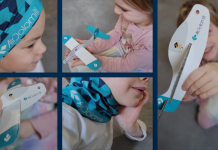Who said that time on board is wasted?
Our routes are 60 minutes on average, – precious time that you can use to improve your skills.
Sure, you can always read a book, take a nap or do yoga and mindfulness as described in this article.
But why don’t you try something different, an exercise that can improve a skill and enhance your performance?
- Practise your conversation skills, even better if you do it in a foreign language. Start by politely asking a question to the passenger sitting next to you. If you feel they don’t want to talk, then respect their privacy and go to step 2. However, if they seem to be willing to chat a bit, introduce yourself and say why you are flying and ask them vice-versa. The most used language between people of different nationalities is English, of course. But you can push yourself to brush up on any other language you know. It’s normal to make mistakes, but practising conversation – especially if it’s pleasant – is the key to enriching your own vocabulary and improving your fluency.
- Train your hands with exercises for pianists. Exercises to improve finger coordination are important for those who play musical instruments such as piano, guitar and violin. These exercises improve the precision and speed of the fingers in preparation for playing more complex music. However, they can also be useful for surgeons, designers, writers, chefs, climbers and make-up artists, to name just a few. Anyone who works with their hands can exercise them by tapping their fingers on the tray table, first from the thumbs to the pinkies, then from the pinkies to the thumbs. Or you can strengthen the muscles of the hands by stretching an elastic band between the thumb and index finger, then the middle finger, then the ring finger, and so on. You can even improve the flexibility of your wrists by placing your palms on the back of the seat in front of you with your fingers towards the floor.
- Train your memory by learning a text. Choose a text to learn by heart, ideally one that’s printed on paper. It can be a story, a poem, a lyric or something useful for your work such as a law or chemical process. When you are on the aeroplane, read the whole text once through, then a second time to fully grasp its meaning. Use a pen to circle the most important words and concepts that give the text its meaning. Repeat the words you circled 10 times in the same order. Then start memorising the text properly, reading and re-reading the first sentence until you feel you can repeat it with your eyes closed. Move on to the second sentence, then go back to the first one. Continue until you can repeat everything without hesitation.

- Train your mind with board games. Playing board games on your own or with the person sitting next to you can be a fun and creative way to improve your critical thinking skills. Chess, draughts, card games such as patience or crosswords require strategic planning and help to improve your problem-solving skills. Playing board games can even be a fun way to socialise with other passengers.
- Train your organisational skills. All you need is paper and a pen or a blank page on your laptop. Write down all of the tasks you have to do. Also add activities you’d like to do in your free time and things you’ve been postponing for months because you never have enough time. Next, divide them into three priority levels: high, medium, low. Estimate how long they each take and write this next to each activity. For example: write a presentation – high priority – 3 hours; seasonal wardrobe change – medium priority – 2 hours; cookery class – low priority – 1 hour and 30 minutes.
Organise your “to dos” in your calendar one by one, distributing the high, medium and low priorities so you have good balance between ticking off your responsibilities and making time for yourself every day*




